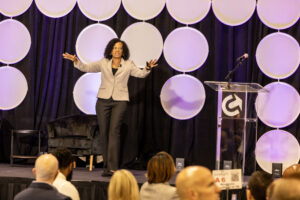Jessica York
So you finally have a polished manuscript, but it’s all cooped up and lonely inside your laptop waiting for someone other than you to finally read it.
Who do you hand your ink baby over to, and are they someone who knows how to market your book to the largest audience possible? Do you even want a large audience? Can you market the book on your own?
We sat down with Sybil Baker, professor at The University of Tennessee at Chattanooga and author of an upcoming novel called “While You Were Gone,” to ask for advice on the business of marketing and selling your new book.
Find part one of this article, on getting your manuscript written, here.
Trend: Your newest novel, “While You Were Gone,” was published with a small press called C&R. Why did you choose them and what are the advantages of publishing with a small press?
Baker: The intimacy of working with a smaller group.
I can email or text my editor and publisher, and hear right back from them. Usually you have more control over the book cover and design. That’s a cool thing about small presses.
The other cool thing about the small presses I’ve been with is that I can have a better relationship with their other authors. I get to meet a lot of other writers on the press and read their work.
I really, really like the work that C&R Press is putting out. They have a diverse lineup. If I were at a big press it wouldn’t have that feeling.
T: What are the advantages and disadvantages of publishing with a big press?
B: First of all, you have to have an agent to get published through a big press.
When the book goes out, you get a contract. And if the big press thinks your book is going to be really big, they put a lot of time and energy into it. They might pay for book tours. Obviously your book is much more available at bookstores, and bookstores are more interested in doing readings.
So with a big press, accessibility, publicity and availability is much higher.
If, however, they think your book isn’t going to do that well, a lot of times they won’t put any time or money into it.
T: What about self-publishing?
B: Self-publishing is kind of a microcosm of small press publishing. You have total control of your work, but the availability and accessibility is going to be less.
Unless you’re writing fiction—which already has a big audience—or already have a large social media presence, self-publishing makes it hard to get your book out to people.
Some authors don’t mind this though.
My husband, for example, published a bunch of flash fiction pieces in literary magazines that were enough to make a book, but he had no interest in going the traditional publishing route because he wanted to bring in his own photos. He’s a web designer and a book designer, so he wanted to do it himself, and he didn’t really care if anyone read it.
He only published about 20 copies and gave them to family and friends. He didn’t even try to sell it to anyone or market it.
Some people like to write, but don’t care about having an audience, which goes great with self-publishing.
T: When should I start marketing my novel?
B: With a big press, marketing begins six months before the book is out. So they actually have advance review copies six months before, but they use that time to promote the book.
Big presses have full-time marketing teams. With small presses the marketing work mostly falls to you.
Developing spreadsheets with names of people to contact for marketing help is important—the hardest time to compile this is when you’re trying to sell your first book. But on your second book, you’ll have that list of contacts created already.
Developing that media list can take a long time, especially if you’ve never done it before and especially if you’re self-publishing.
Most media outlets will want your book submitted at a minimum of three months in advance before publication. So you need to be developing a marketing plan before that ideally.
T: How do I get reviews for my book?
B: First, set realistic expectations.
Fewer newspapers and book publications do book reviews now. More books are published every year. Top book reviewers get thousands of books every day, and they’re only reviewing a couple a week or month.
What’s helped me is keeping it local.
Chapter 16 is an organization that is really good about reviewing books by people who live in Tennessee, and they give Tennesseans great coverage and press.
Also there are small press book reviews, which are not The New York Times, but they do cater towards small press books.
I would also recommend that people review books themselves because doing that will help you learn more about the industry.
T: Should my profession affect how I brand my book?
B: It depends on the book you’re writing and your profession.
Scott Turow, for example, is a lawyer who writes lawyer crime novels. There’s also Shawn le Carre, who was a spy for Britain, and he writes about British spies.
So if you’re having a novel in which a dentist solves crimes, if you’re a dentist that’s great. In that sense using your profession in your branding can be helpful.
But if you’re an accountant by day and romance writer by night, then maybe there’s not much connection.
T: What other kinds of events or publications can I use to promote my book?
B: Depending on your book, bookstore readings are not the best way to sell your work anymore—especially if you write nonfiction.
You want to create your own events.
So let’s say you’re trying to promote your how-to-book: “How People in Their Twenties Can Save Retirement Money.” You want to visit places and groups that have 20-year-olds as their main demographic, and bookstores may not always have that age group readily available.
You’d find organizations that have that age group, and then offer to speak. And you don’t just say, ‘Hey, I want to read from my book.’ You say, ‘I’d like to come and talk about the importance of saving money for retirement.’
It’s important to think about different talking points that aren’t just about your book.
You should pitch topics to write about for magazines and publications that aren’t just: ‘I want to talk about my book. Please buy it.’ What kind of information can you offer that readers might be interested in? And, of course, you can maybe mention your book briefly in those kinds of articles.
About Sybil Baker:
Sybil Baker is the author of four books of fiction and one book of nonfiction. Called “an amazing and essential odyssey for our times,” “Immigration Essays” is the 2018-19 Read2Achieve selection for the University of Tennessee at Chattanooga. Sybil is also the author of “The Life Plan,” “Talismans,” and “Into This World” (Foreword Book of the Year finalist, and Eric Hoffer Award Honorable Mention). She was awarded two MakeWork Artist Grants and a 2017 Individual Artist's Fellowship from the Tennessee Arts Commission. She lives and teaches in Chattanooga, Tennessee, and is on faculty at the Yale Writers’ Workshop. Her latest novel will be published in June by C&R Press.
Visit Baker's site here.







